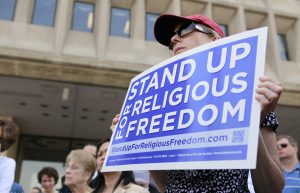
“Congress shall make no law respecting an establishment of religion, or prohibiting the free exercise thereof.” US Constitution, Bill of Rights, Amendment I, first line. There was a time when most Americans could agree that protecting the free exercise of religion was of the utmost importance. Now, the US Commission on Civil Rights is trying to make sure that religious liberty is limited “as narrowly as applicable law requires.”
The Commission, chaired by Martin Castro (an appointee of President Obama), found that “[r]eligious exemptions to the protections of civil rights based upon classifications such as race, color, national origin, sex, disability status, sexual orientation, and gender identity, when they are permissible, significantly infringe upon these rights. Although the First Amendment’s Free Exercise Clause and the Religious Freedom Restoration Act limit the ability of government actors to impede individuals from practicing their religious beliefs, religious exemptions from non-discrimination laws and policies must be weighed carefully and defined narrowly on a fact-specific basis.”
Careful to avoid the words “freedom of worship,” the Commission nevertheless attempts to justify amending the First Amendment’s interpretation so as to severely limit what is understood as “free exercise [of religion].” For example, page 26 of the Commission’s report endorses the view that the First Amendment’s free exercise clause protects “beliefs” but not “conduct” and that such a distinction is “fairer and easier to apply” than the law as it stands under RFRA.
The Commission is clear in their malicious intent: all laws must be written to prioritize the protection of other civil rights that supersede freedom of religion. They are, in essence, recommending that the government be the sole voice in deciding how far the practice of religion is protected, across the board. Commission Chairman Castro frames his reasoning by saying, “Our country was founded by those fleeing religious persecution. We must, therefore, always be vigilant to ensure that religion not be used as a pretext to persecute those whose civil rights and civil liberties should be protected.” Castro’s words here are brilliantly and viciously formulated. He starts with a truth — our forefathers (and mothers) were fleeing religious persecution, in that they were being persecuted for their faith. But he then immediately casts suspicion on that goal by implicitly tying religion to the cause of that persecution. It is this negative view of religion which seems to permeate every aspect of the document.
However, the Commission gives “no coherent reason” for taking this stance, as University of Virginia Law School Professor Douglas Laycock has pointed out. “This report gives no reason for preferring the rights of the same-sex couple, except that a majority of the [commission] chose up sides.” In a Washington Times interview, dissenting USCCR member Gail Heriot offered a similar opinion: “I’m troubled by the growing attitude that somehow anti-discrimination laws trump everything. We live in a more complex world than that.”
Thankfully, the USCCR is not a governing body, and their recommendations do not have the force of law. When the question arises as to how to balance various Constitutional rights, especially First Amendment rights, there must be a more careful approach taken than the one that the Commission recommends.
Kevin Dawson is the Operations Manager at American Principles Project.


